|
|
|
Sort Order |
|
|
|
Items / Page
|
|
|
|
|
|
|
| Srl | Item |
| 1 |
ID:
190052
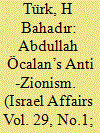

|
|
|
|
|
| Summary/Abstract |
Anti-Zionism has been a salient component of rightwing and leftwing movements in Turkey. The Kurdistan Workers’ Party (Partiya Karkerên Kurdistan, PKK) that took its cue from the Turkish Left has become a topic of discussion since its founding in 1978. Yet little effort has been devoted to analysing the political thought of the PKK’s leader, Abdullah Öcalan. Using an interpretative-textual method, this article seeks to fill this lacuna by discussing the role of anti-Zionism in Öcalan’s thought.
|
|
|
|
|
|
|
|
|
|
|
|
|
|
|
|
| 2 |
ID:
189462
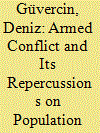

|
|
|
|
|
| Summary/Abstract |
The study empirically examines the impact of armed conflict on population growth in Eastern Turkey. The empirical findings confirm the implications of the theoretical model in the body of the paper. The results indicate that PKK recruitment leads to depopulation at the district level while increases rural population growth. Moreover, the results indicate that the number of killed PKK militants in the province to which a district belongs negatively affects population growth at the district level. On the other hand, the results also indicate that number of killed PKK militants does not significantly affect the population growth at the district level while decreases rural population growth. The results show that the percentage of valid votes to registered voters increases the population growth at the district level.
|
|
|
|
|
|
|
|
|
|
|
|
|
|
|
|
| 3 |
ID:
088933


|
|
|
|
|
| Publication |
2009.
|
| Summary/Abstract |
This article addresses the conflict over the Euphrates and Tigris waters from the perspective of negotiation theories, by examining the role of power in upstream/downstream negotiations. Conceptual and empirical links are established between water, negotiation (structure, process), power (asymmetries, coalition dynamics, strategies, development of alternatives) and security (direct/indirect interests such as national security, border security, territorial claims, economic development and environmental concerns). The study concludes that asymmetries in power have favored upstream/downstream interactions towards bilateral if not basin-wide arrangements. The framework shows that traditional elements of power, such as upstream positions, military and economic resources, do not constitute the only sources of power. Bargaining power can also determine the dynamics between respective riparians. Time constitutes an important source of power, and interests vary over time when political settings and security concerns shift. Downstream or more vulnerable riparians can invert situations of power asymmetry by acting on the basin-dominant riparian's interests and thus reduce its alternatives. Syria's use of 'issue-linkage' in its interactions with Turkey over water and wider security issues serves as the primary example.
|
|
|
|
|
|
|
|
|
|
|
|
|
|
|
|
| 4 |
ID:
141407


|
|
|
|
|
| Summary/Abstract |
The car bomb sounded like a car backfiring. I heard it, dismissed it, and went back to sleep. It was only a few hours later, as I sat at the window of Erbil’s Hotel Merci, looking out over a two-story image of Leo Messi advertising Pepsi, that I realized how close I had been—too close for comfort—to the city’s first bombing in nearly a year. It had exploded only a few blocks away.
|
|
|
|
|
|
|
|
|
|
|
|
|
|
|
|
| 5 |
ID:
190682


|
|
|
|
|
| Summary/Abstract |
This study investigates the peace process between the Turkish government and the PKK, invoking the mutually hurting stalemate (MHS) and mutually enticing opportunity (MEO) formulations of Ripeness Theory. It questions why the negotiations failed although Turkey’s conditions had become ripe for resolution. This research shows that even though the ripe moment occurred before the process steered the parties toward the negotiation table, their perspectives regarding the table ultimately changed due to both domestic and international developments. Hence, the MHS seized at the beginning of the process did not turn into the MEO that would lead to resolution.
|
|
|
|
|
|
|
|
|
|
|
|
|
|
|
|
| 6 |
ID:
153612
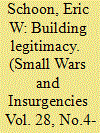

|
|
|
|
|
| Summary/Abstract |
Previous research has identified a variety of general mechanisms to explain how insurgents build legitimacy. Yet, there is often a gap between these mechanisms and the interactional dynamics of insurgencies. This article attempts to bridge this gap through a theoretically informed analysis of the Kurdistan Workers’ Party’s (PKK) insurgency in Turkey. I show how the PKK’s efforts to cultivate legitimacy, Turkey’s counterinsurgency strategies, and civilian perceptions of the PKK, all mutually influenced one another. Based on this analysis, I argue that the mechanisms that produce popular legitimacy coevolve with insurgents’ behaviors, states’ interventions, and civilians’ perceptions.
|
|
|
|
|
|
|
|
|
|
|
|
|
|
|
|
| 7 |
ID:
105993
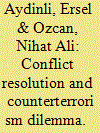

|
|
|
|
|
| Publication |
2011.
|
| Summary/Abstract |
This article considers the relationship between two processes-conflict resolution and counterterrorism-which conceptually share many common points, yet in practice do not necessarily proceed together easily towards a common goal. Considering particular cases of ethnic conflict in which terrorist factions exist, the article argues that while neither conflict resolution nor counterterrorism alone can adequately address the problem, simultaneously conducting both must keep in mind the processes' inherent differences and avoid excessive prioritizing of one over the other. By exploring recent Turkish governmental initiatives to address the Kurdish question, the article attempts to provide an outline for how to successfully cope with the two processes simultaneously.
|
|
|
|
|
|
|
|
|
|
|
|
|
|
|
|
| 8 |
ID:
183034
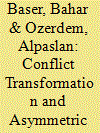

|
|
|
|
|
| Summary/Abstract |
In this article, we examine the dynamics of the Kurdish-Turkish peace process that collapsed in the summer of 2015. The negotiations began when the conflict reached a certain level of ripeness, one that made it possible for both sides to entertain the possibility of compromise on various taboo issues. However, in the face of both domestic and international developments, the process came to an abrupt halt. This article argues that the main reason the process stalled was because it was built from the start around the idea of “resolution” rather than “transformation,” a concept better suited to responding to highly fluid asymmetric conflicts.
|
|
|
|
|
|
|
|
|
|
|
|
|
|
|
|
| 9 |
ID:
160993
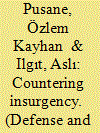

|
|
|
|
|
| Summary/Abstract |
Insurgents often develop international connections and benefit from external assistance from a variety of sources. Support from diaspora communities has long been considered one of the critical external factors in the persistence of insurgent groups. Yet how the counterinsurgent state addresses external support from transnational ethnic communities and what factors influence the state's policies remain understudied. By focusing on the transnational political practices of the Kurdish community and the PKK in Western Europe, this paper examines how Turkey has addressed the diasporic support for the PKK since the 1980s. It shows that three major factors – the composition of foreign policy decision-makers, their ideological contestation over the Kurdish question, and the European political context – have affected Turkey's policy regarding the PKK's transnational dynamics in Europe.
|
|
|
|
|
|
|
|
|
|
|
|
|
|
|
|
| 10 |
ID:
188053


|
|
|
|
|
| Summary/Abstract |
This study quantitatively and qualitatively analyzes the impact and effectiveness of Turkey’s deterrence-oriented incapacitation effort throughout Turkey’s PKK conflict (1984–2018). By employing vector autoregressive (VAR) analysis, this study quantitatively finds that incapacitation did not reduce PKK violence over the long term and yielded a short-term counterproductive effect. Descriptive analysis asserts that while incapacitation had important mid-term deterring effects, it did not have any sustainable mitigation on the PKK insurrection. This is because, as this study argues, these deterrent impacts were not strategically converted into political gains/results. Considering the latest phase of the conflict, in which Turkey’s intra-state strife has become increasingly regionalized and lately internationalized in military and political terms with the emergence of the Syrian civil war, particularly the rise of the People’s Protection Units (YPG), this study claims that the sole application of an incapacitation-oriented eliminationist approach has become less relevant and less effective. The study suggests that deterrence should be considered within the strategic tit-for-tat game to force/compel the non-state actor to make the conflict more manageable by transforming it in a strategic way, in which strategy of deterrence is to be attached to visionary, long-term, and viable grand strategic political end-states and to be considered within the grand bargaining game.
|
|
|
|
|
|
|
|
|
|
|
|
|
|
|
|
| 11 |
ID:
173146


|
|
|
|
|
| Summary/Abstract |
Abstract: In a region undergoing dramatic changes, the Kurds in particular have begun to enjoy a political resurgence. Of those countries where Kurds reside, Turkey is the single most important actor for several reasons: It is a powerful state that is home to more than half of the total Kurdish population; it has been locked in a stalemate with (arguably) the most powerful Kurdish insurgent group, the Kurdistan Workers’ Party [Partiya Karkeren Kurdistan, PKK]; this decades-long armed conflict progressively has acquired a trans-border disposition and fomented disagreement between Turkey and the United States in Syria; and lastly, Turkey under the Justice and Development Party [Adalet ve Kalkinma Partisi, AKP] gradually is distancing itself from the Western bloc and moving away from democratic values and principles. This article examines the evolving Kurdish question in Turkey with an emphasis on how it is interacting with changing domestic, regional, and global dynamics.
|
|
|
|
|
|
|
|
|
|
|
|
|
|
|
|
| 12 |
ID:
149423


|
|
|
|
|
| Summary/Abstract |
Over the last several years, the political will of the governing AKP in Turkey to make the historic compromises necessary to complete the peace process with the Kurds has sharply declined. This paper will examine the causes of the breakdown in the Turkish-Kurdish peace process and the Turkish government’s lurch in a nationalist direction in its approach towards the Kurdish minority from the standpoint of ‘securitization’ theory. The key catalysts, it is argued, for the re-emergence of a securitization paradigm in Turkey’s handling of the Kurdish issue are: (1) Turkey’s stalled bid for accession to the European Union; (2) the intensifying electoral competition between AKP and the Kurdish movement parties, coupled with the instrumentalization of the Kurdish peace process to serve President Recep Tayyip Erdoğan’s quest to install a dominant presidential system and (3) the spillover effects of Syria’s civil war on Turkey’s relations with its own Kurdish populace.
|
|
|
|
|
|
|
|
|
|
|
|
|
|
|
|
| 13 |
ID:
175139
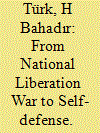

|
|
|
|
|
| Summary/Abstract |
The leader of the Kurdistan Workers’ Party (Partiya Karkerên Kurdistan or PKK), Abdullah Öcalan, has played a crucial role in shaping the road map of the PKK since the founding of the organization in 1978. His ideas have substantially influenced the structure of the PKK. This article analyzes whether Abdullah Öcalan’s perspective on violence changed over the period between the founding of the PKK and the present. Using an interpretive–textual method, the study examines Öcalan’s approach to the question of violence before and after his imprisonment on the island of İmralı in 1999. The study attempts to make sense of how his perspective on violence was constructed and developed during these two periods. To achieve this goal, the study demonstrates the differences and similarities in Öcalan’s approach to the concept of violence during these two periods. Accordingly, it is argued that Öcalan’s perspective on violence is marked by continuity rather than a rupture.
|
|
|
|
|
|
|
|
|
|
|
|
|
|
|
|
| 14 |
ID:
118986
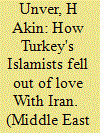

|
|
|
| 15 |
ID:
145644


|
|
|
|
|
| Summary/Abstract |
Turkey has lately been in the midst of trying to resolve its three-decade old struggle with the Partiya Karkeren Kurdistan (PKK). Elaborating on the history of this conflict, this study analyzes why previous attempts to resolve it failed and why other conflict-resolution opportunities were not taken until 2007. It devotes particular attention to the emergence and failure of the latest resolution process and analyzes prospects and challenges of a potential resolution by analyzing the context, content, and conduct of Turkey's latest peace attempt. This study finds, first, that the PKK has been open to a negotiated settlement since 1993, but the state regime rejected reconciliation and pursued unilateral military solutions until 2007, when Turkey finally recognized the military stalemate and costly deadlock. Second, it argues that what really forced Turkey to search for a resolution are—in addition to the hurting stalemate—recent national and regional power shifts, which have also destabilized the resolution process itself. Third, this study asserts that despite the ripe conditions for resolution, the context and the content of the latest process revealed crucial deficiencies that require a complete restructuring of the central government as well the need to develop greater institutionalization and social engagement for a potential conflict resolution. Finally, this study claims that the nature and characteristics of the current phase of the conflict, as they stand, indicate significant fragilities and spoiling risks due to both internal and external dynamics and actors, as recent developments have indicated in the failure of the latest resolution attempt.
|
|
|
|
|
|
|
|
|
|
|
|
|
|
|
|
| 16 |
ID:
137738
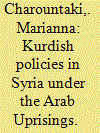

|
|
|
|
|
| Summary/Abstract |
The effect of the Arab Uprisings on the interplay of state and non-state entities is revealed as influencing the emergence of multiple players of non-state status pursuing democratic rights, and as attempting to dismiss regional despotism as an intrinsic element of ongoing transition in the Middle East. This article focuses on the positive overall effect on the Kurdish movement of unity and cooperation between KRG and PKK-PYD actors to achieve Kurdish harmony, and as interconnected paradigms vis-à-vis their influence and interaction with regional players. Given the rise of the Kurds in Syria and the KRG’s regional importance as the first actual Kurdish de facto state entity, the PKK’s role appears key for unifying and institutionalising the relatedness of the Kurdish movements in Iraq and Syria. An empirical understanding of the Kurdish case, explained through a conceptual model of ‘multi-dimensional interrelations’, may further clarify how the theoretical framework can be applied to International Relations
|
|
|
|
|
|
|
|
|
|
|
|
|
|
|
|
| 17 |
ID:
139360
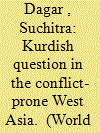

|
|
|
|
|
| Summary/Abstract |
No other region in the world has seen as much violence, physical destruction and civilian casualties, internal displacement of population, militarization of society and enduring psycho-social trauma in the past decade as West Asia. With the increase in the number as well as intensity of armed conflicts in the region since the US-led invasion of Iraq in March 2003, West Asia remains the locus classicus of recurrent warfare.
|
|
|
|
|
|
|
|
|
|
|
|
|
|
|
|
| 18 |
ID:
113210
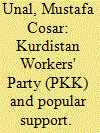

|
|
|
|
|
| Publication |
2012.
|
| Summary/Abstract |
The PKK has been a prolonged problem in Turkey, and various measures have been adopted to diminish and end the violence. In addition to the impacts on violence, these policies have also had an impact on public opinion and ethnic awareness of Kurds in Turkey. This article analyzes these policies and their effects on electoral support for the PKK by examining the vote shares of the pro-PKK political parties in national and local elections. It concludes that Turkey has conceptualized the issue solely as a problem of terrorism, but the goal, strategy, organization, and format of violence used by the PKK reflect the nature of an insurgency. Therefore, it is argued that Turkey, by ignoring the insurgency features, has disregarded the legitimate parts of the cause and related popular support, and thus has responded mostly with deterrent measures apart from the reforms of recent years. Results have shown that policies of deterrence culminated in a steady level of support for the PKK indicating that low level of legitimacy - as they were perceived by the people - of the policies resulted in viable popular and political support for the PKK. Despite the recent accommodative reforms, the existence of pro-PKK parties rallying electoral support in the political arena provided sustained level activities in the conventional politics in Turkey's municipal and national political system, in which they pursue pro-PKK agendas, such as 'Autonomy' and 'Confederation' as well as activities to increase the distinction in identity around the ethnic consciousness for more popular support. Yet, no clear pattern is identified between violence level and popular support in the macro-scale.
|
|
|
|
|
|
|
|
|
|
|
|
|
|
|
|
| 19 |
ID:
118886
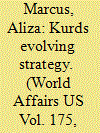

|
|
|
| 20 |
ID:
168384


|
|
|
|
|
| Summary/Abstract |
This article explores the extent to which the secret talks influenced the path of official negotiations toward ending Turkey's Kurdish conflict, which the scholarly literature has yet to assess. Utilizing interviews with key political actors, this article aims to close this gap by assessing the Oslo talks (2006–2011) as the most comprehensive secret contact between the Turkish government and Kurdistan Workers' Party. It demonstrates that the secret track is not merely a “pre-negotiation” stage aimed at de-escalating the violent conflict ahead of official talks, but also a crucial part of the negotiation stage aimed at establishing a final political agreement.
|
|
|
|
|
|
|
|
|
|
|
|
|
|
|
|
|
|
|
|
|